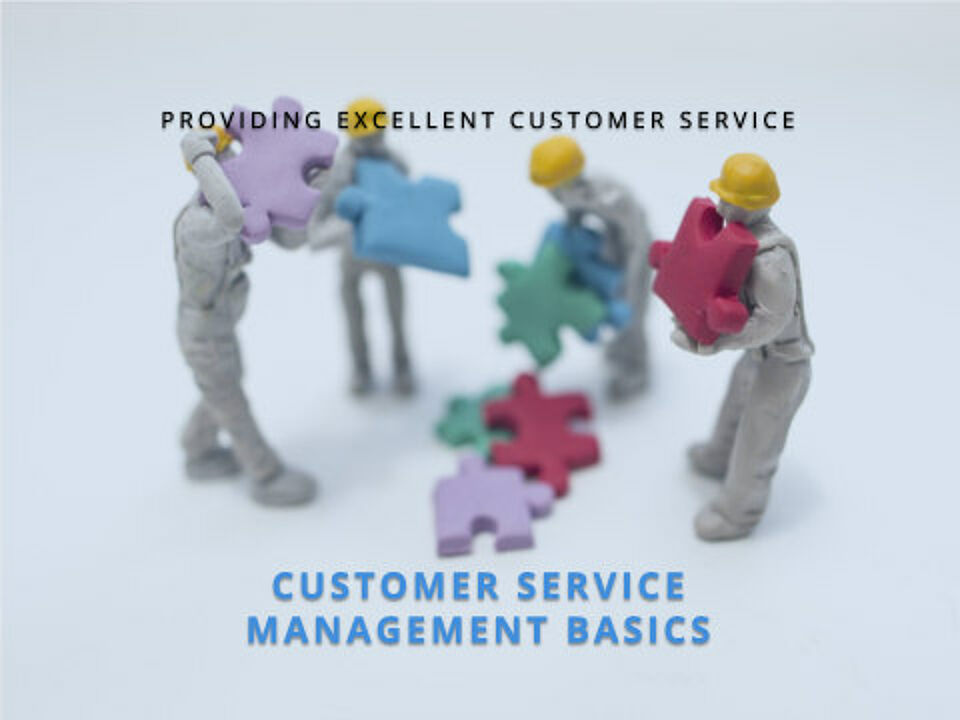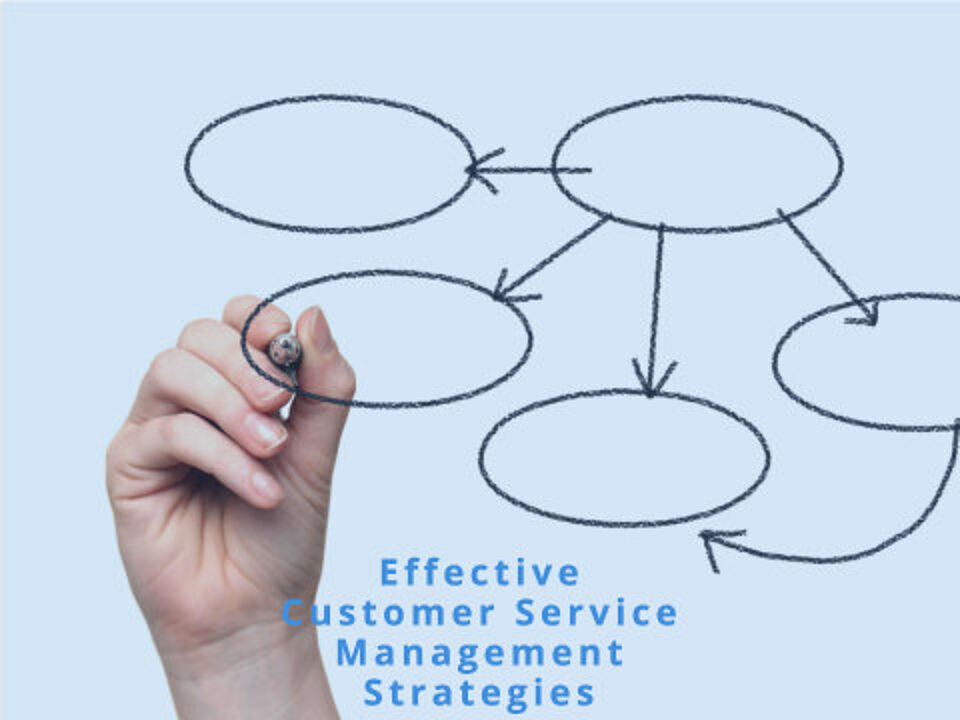
The concept of customer service management plays a very important role in today's business world. Customer expectations are constantly rising. Organisations should strive to provide outstanding customer service. This blog article provides a comprehensive overview of CSM and highlights its importance for companies.
Autor: Ralph Bockisch
Creation: 16.03.2024, last change: 23.04.2024
Table of contents
Definition von Customer Service Management
Basics of customer service management
The role of technology in customer service management
Strategies for effective customer service management
Challenges in customer service management
Best Practices im Kundenservice-Management
The future of customer service management
Definition of Customer Service Management
Customer service management refers to the entirety of processes, practices and strategies that companies use to optimise customer service and ensure first-class customer care. It encompasses all aspects of interaction with the customer, from the initial contact through the various touchpoints and channels to post-purchase support and problem solving. Optimised customer service management aims to design workflows and the deployment of service desk staff in such a way that customer enquiries are processed in a targeted and reliable manner in order to achieve a high level of customer satisfaction. This also includes the use of self-service portals and systems for selecting and processing customer concerns.
The importance of CSM for companies
In a market characterised by high competition and open customer reviews, a transparent and customer service-oriented approach is increasingly becoming a decisive factor for a company's success. CSM enables companies to identify and eliminate bottlenecks in customer service, speed up processes and increase customer satisfaction. Through optimised customer service management strategies, companies can strengthen their customer relationships, proactively address customer issues and ultimately drive business growth. The ability to best scale services and support while delivering outstanding customer experiences sets industry benchmarks and helps organisations stand out from the competition.
A brief overview of the evolution of CSM
The evolution of Customer Service Management reflects advances in technology and changes in customer expectations. From traditional call and contact centres to today's comprehensive CRM (Customer Relationship Management) systems, CSM has evolved to become an integral part of the entire business. Modern CSM solutions are designed to accurately capture and deliver all customer-related data to ensure smooth customer interaction and care. With the advent of AI-driven chatbots, automated self-services and comprehensive analytics tools, companies can now offer transparent, cross-departmental and optimised customer service that is specifically tailored to the needs and requirements of customers. This evolution towards intelligent and proactive CSM not only enables companies to optimise their customer service processes, but also to take their customer relationships to the next level and secure long-term growth.

Basics of Customer Service Management
Customer service management is an essential part of any business strategy that aims to maximise customer satisfaction and build long-term relationships with customers. This section dives deeper into the fundamentals of customer service management by exploring its definition and objectives, the core functions of CSM systems and the differences to traditional customer service.
Definition and goals of customer service management
Customer service management refers to a company's systematic approach to managing its interactions with current and potential customers. It goes beyond responding to enquiries and encompasses the proactivity of customer care, the personalisation of the service experience and the continuous improvement of service quality. The main goals of CSM are to increase customer satisfaction, promote customer loyalty, minimise customer churn and ultimately increase sales. CSM strives to ensure a positive customer experience at every stage of the customer journey, from initial interaction to after-sales support.
Core functions of CSM systems
CSM systems are technological solutions designed to increase the efficiency and effectiveness of customer service. These systems integrate various functions that are crucial for managing customer interactions:
- Multi-channel support: allows customers to communicate through their preferred channels such as email, phone, live chat, social media and self-service portals.
- Customer knowledge base: A centralised database containing frequently asked questions (FAQs), how-to guides and other helpful resources to provide customers with quick self-help options.
- Ticketing system: Automates the capture, assignment and tracking of customer enquiries to ensure that no customer concern goes unanswered.
- Feedback and survey modules: Gather customer feedback on their service experience that can be used to make improvements and personalised offers.
- Reporting and analytics: Provides insights into customer trends, service performance and areas that need improvement to enable data-driven decisions.
Difference between CSM and traditional customer service
The main difference between customer service management and traditional customer service lies in the scope and depth of customer care. While traditional customer service is often reactive and limited to responding to specific enquiries, CSM is proactive and comprehensive. CSM focuses on the entire customer experience, uses technology to manage interactions across multiple channels, and strives to maximise customer satisfaction through personalised services and continuous engagement strategies. CSM uses data analytics to anticipate customer trends and resolve potential issues before they can impact customer satisfaction, whereas traditional customer service often only responds to issues after they have occurred.
By understanding the fundamentals of customer service management, organisations can improve the quality of their customer service and build a strong, loyal customer base that is critical to long-term success.
The role of technology in customer service management
In today's fast-paced and digitally connected world, technology plays a crucial role in the transformation of customer service management. It enables companies to make their customer service more efficient, personalised and accessible. This section looks at how CSM software solutions, the integration of AI and automation, and cloud-based and hybrid systems are improving customer service.
Overview of CSM software solutions
CSM software solutions are purpose-built platforms designed to optimise the management of customer interactions and service processes. These comprehensive systems offer a variety of features including, but not limited to, multi-channel support, customer knowledge bases, ticketing systems, customer feedback modules, and reporting and analytics. By automating routine tasks and providing centralised information, CSM software solutions enable companies to respond quickly to customer queries, provide personalised service and ensure a consistent customer experience across all touchpoints.
Integrating AI and automation into customer service
Artificial intelligence (AI) and automation are revolutionising customer service by increasing efficiency and creating new opportunities for personalised customer interactions. AI-powered chatbots and virtual assistants can handle simple enquiries around the clock, extending the availability of customer service without the need for additional human resources. These technologies can also analyse customer behaviour, perform predictive analytics and provide personalised recommendations, resulting in an improved and more personalised customer experience. Automation further helps to reduce the processing time of enquiries and increase the productivity of the customer service team by taking over repetitive tasks.
Advantages of cloud-based and hybrid CSM systems
Cloud-based and hybrid CSM systems offer flexibility, scalability and cost efficiency. Organisations can access key customer service data and functions from anywhere, which is particularly beneficial for distributed teams or remote working models. Cloud solutions enable easy scaling of service capacity to cope with peaks in customer service requests without the need for significant upfront investment. Hybrid models also offer the ability to store sensitive data on-premise while running other functions in the cloud to fulfil security and compliance requirements.
Advantages of EcholoN in CSM
EcholoN, as a CSM solution, offers a comprehensive approach to managing customer interactions and support. By integrating enterprise service management capabilities, EcholoN enables organisations to deliver a consistent and efficient service. Its strength lies in its ability to simplify complex service processes by providing a centralised platform for all customer service activities. In addition, EcholoN supports the automation of service processes, the provision of self-service and the use of AI for advanced analyses and decision-making. By optimising the customer service process, EcholoN helps companies to increase customer satisfaction, improve efficiency and ultimately drive customer engagement and loyalty.
The introduction of modern technology into customer service management enables organisations to meet changing customer expectations and gain a competitive advantage by delivering outstanding customer service experiences.

Strategies for effective customer service management
Outstanding customer service is not a product of chance; it is the result of careful planning and implementation of strategic decisions. At the heart of these efforts are the personalisation of customer service, the implementation of omnichannel strategies and the use of data for decision-making. These approaches help to turn customers into loyal advocates of the brand, product or service.
Personalisation of customer service
In a world where customers are inundated with offers, personalising customer service can help a company stand out from the competition. Personalisation means recognising the customer, understanding their preferences and previous interactions and translating this insight into tailored service experiences. This can range from simple gestures such as using the customer's name in communications to more complex systems that offer customised recommendations based on previous purchases or interactions. Personalised service increases customer satisfaction, fosters loyalty and increases the likelihood of cross-selling and upselling opportunities.
Omnichannel strategies for a cohesive customer experience
Customers interact with brands through a variety of channels, including email, social media, live chat and more. An omnichannel strategy ensures that these interactions are seamless and provide a consistent customer experience across all channels. This means that customers can start the conversation on one channel, continue it on another and expect a continuous quality of service. Omnichannel strategies require strong integration of technology and data infrastructure to ensure that customer data is accessible and usable across all channels. The result is a smooth, efficient and satisfying customer experience that increases customer satisfaction.
Data-driven decision making in CSM
Data is the backbone of effective decision making in Customer Service Management. Analysing customer data - from behavioural patterns to feedback and service interactions - can provide valuable insights into customer needs and preferences. This information enables companies to proactively identify challenges, recognise opportunities for personalisation and develop strategies to improve customer service. Data-driven decisions can relate to everything from optimising resource allocation to developing targeted marketing campaigns and tailoring products or services to customer needs. By relying on data, organisations can refine their CSM strategies to achieve greater customer satisfaction and loyalty.
By implementing these strategies, companies can establish effective customer service management that not only responds to customers' current needs, but also anticipates and exceeds future expectations.
Challenges in customer service management
While the implementation of effective customer service management is of great importance for companies, it also brings with it a number of challenges. These challenges range from managing rising customer expectations and ensuring data protection and compliance to overcoming technological and integration hurdles. These key challenges and possible approaches to overcoming them are discussed below.
Dealing with high customer expectations
Today, customer expectations of service are higher than ever. Customers are looking for fast, efficient solutions to their problems and expect personalised treatment across different channels. The challenge for organisations is to meet these expectations by providing a smooth, consistent and high-quality service. This requires not only the implementation of advanced technologies and processes, but also constant monitoring and adjustment of services to ensure that customer satisfaction is maintained and improved.
Ensuring data protection and compliance
At a time when the protection of personal data is becoming increasingly important, organisations need to ensure that their CSM practices comply with applicable data protection laws and regulations. This includes the secure handling, storage and processing of customer data to build trust and avoid legal consequences. The challenge is to implement robust data protection practices that comply with requirements without compromising the efficiency of customer service. This may require careful planning, regular reviews and updates of privacy policies, and training for employees.
Overcoming technology and integration hurdles
Whilst the introduction of new technology into customer service offers significant benefits, it can also present challenges in terms of integration with existing systems and processes. Organisations need to ensure that new CSM tools work seamlessly with their existing IT infrastructure to ensure data consistency and avoid duplication of effort. In addition, technology upgrades can be costly and often require extensive staff training to ensure they are utilised effectively. Overcoming these hurdles requires careful planning, selection of compatible technology solutions and ongoing support and training for staff.
Overcoming these challenges requires strategic planning, continuous monitoring of services and adaptation to changing circumstances and technologies. By overcoming these obstacles, organisations can maintain effective customer service management that not only meets current customer needs, but also provides a solid foundation for future growth and success.

Best Practices in Customer Service Management
Excellent customer service is a decisive competitive advantage. To achieve this, it is important to implement best practices in customer service management. These best practices include the strategic use of customer feedback, the ongoing training and development of customer service teams and the continuous measurement of customer satisfaction and service quality. By implementing these key strategies, companies can not only increase customer satisfaction, but also secure their loyalty in the long term.
Using customer feedback to improve service
Customer feedback is a goldmine of information that organisations can use to continuously improve their service. By actively soliciting feedback - whether through surveys, reviews, social media interactions or direct customer feedback - organisations can gain insight into their customers' needs and expectations. This feedback should be systematically analysed and used to identify specific improvement measures, be it in relation to product offerings, customer service processes or the overall customer experience. An open and responsive attitude to customer feedback signals to customers that their opinions are valued and helps to create positive customer experiences.
Training and development of customer service teams
The customer service team is often the first point of contact between a company and its customers. Therefore, the ongoing training and development of these teams is crucial to providing excellent service. Regular training should include not only the latest customer service techniques and technologies, but also soft skills such as empathy, patience and problem-solving skills. Fostering a strong service culture and investing in employee development will help build a dedicated team that is willing to go above and beyond what is expected to deliver excellent customer service.
Measuring customer satisfaction and service quality
Continuously measuring and analysing customer satisfaction and the quality of customer service is essential for evaluating the effectiveness of the CSM. Metrics such as Net Promoter Score (NPS), Customer Satisfaction Score (CSAT) and First Contact Resolution (FCR) provide valuable insights into the performance of the customer service team and overall customer satisfaction. This data helps companies to identify strengths and weaknesses in their customer service processes and implement targeted improvement measures. Regular monitoring and adjusting strategies based on these metrics can help to continuously improve service quality and exceed customer expectations.
By implementing these best practices, organisations can establish a high-performance customer service management system that not only meets today's requirements, but also creates a solid foundation for future success and customer satisfaction.
The future of customer service management
The landscape of customer service management is constantly changing, driven by technological advances and evolving customer expectations. To remain competitive, organisations need to understand and adapt to the latest trends and innovations in CSM. The growing importance of customer experience (CX) as a critical factor for business success must also be recognised. This section discusses future trends in CSM, the growing importance of CX and predictions for the development of CSM technologies.
Trends and innovations in CSM
Several key trends are emerging in the future of customer service management that will fundamentally change the way organisations interact with their customers:
- Artificial intelligence and automation: AI-powered technologies, such as chatbots and virtual assistants, will increasingly be able to handle complex customer enquiries, increasing efficiency and freeing up staff.
- Personalisation: Data analytics technologies will enable companies to personalise customer experiences even further by identifying behavioural patterns and responding precisely to customers' individual needs.
- Omnichannel service: The seamless integration of different service channels into a coherent customer experience will continue to gain in importance in order to meet customers where they are.
The growing importance of customer experience (CX)
Customer experience encompasses every aspect of a customer's interaction with a company, from first perception to after-sales service. In an increasingly saturated market, CX is becoming a key differentiator. Companies that offer an outstanding CX can not only stand out from the competition, but also increase customer loyalty and retention. Investing in a positive CX is therefore an investment in the long-term success of the company.
Predictions for the development of CSM technologies
The technologies that support customer service management are developing rapidly. We can predict the following developments for the future:
- Integration of augmented and virtual reality: AR and VR could open up new avenues for interactive and immersive customer service experiences, for example by enabling virtual product presentations or remote support services.
- Proactive customer service: Thanks to predictive analytics, companies will be able to recognise potential problems before they become noticeable to the customer and proactively offer solutions.
- Emotion recognition technology: Analysing speech patterns and facial expressions in real time could enable customer service staff to better understand customers' emotions and adapt their responses accordingly.
The future of customer service management promises exciting developments and innovations that offer companies new opportunities to increase customer satisfaction and strengthen customer loyalty. Those that recognise these trends and integrate them into their CSM strategies will be well positioned to succeed in an increasingly customer-centric world.
Final conclusion
Implementing and maintaining world-class customer service management is more than just an operational necessity; it is a strategic investment in an organisation's future viability and competitiveness. This conclusion summarises the key aspects of CSM, highlights its critical role in today's business environment and provides final thoughts on the need for continuous improvement in customer service.
Summarising the key aspects of CSM
CSM is at the centre of any customer-centric business approach. It integrates transparent communication channels, efficient problem-solving methods and personalised customer service experiences to maximise customer satisfaction. The main role of CSM is to proactively identify and respond to customer needs by deploying the right resources and service desk staff to resolve customer issues. By optimising customer service, companies can enhance their customer service by responding to a range of use cases with tailored solutions based on thorough selection and analysis of customer information.
The critical role of CSM in today's business environment
In an increasingly competitive market environment, an organisation's ability to provide smooth and efficient customer service is critical to ensuring customer loyalty and retention. CSM plays a critical role in ensuring that customer issues are handled across departments and with the highest level of transparency. By offering their customers first-class self-service options and optimised, proactive customer service, companies can not only strengthen existing customer relationships, but also attract new customers. Effective CSM enables organisations to anticipate customer needs and exceed those expectations by providing tailored and valuable solutions.
Final thoughts on continuously improving customer service
The key to maintaining a strong market position lies in a company's ability to continually analyse and improve its customer service. This requires constant re-evaluation of the technologies, processes and resources used, as well as adapting to changing customer demands and market trends. Organisations should focus on providing their customers with more than just products or services; they should strive to create better customer experiences and added value through proactive engagement and support. Ultimately, continuous improvement in customer service is not just a task, but an ongoing commitment to customers that enables long-term customer relationships to be built and maintained and business growth to be sustained.
Perhaps also interesting:
